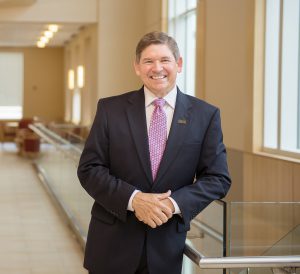By Matthew Liptak

Ray Hoy, J.D. ’86, is surrounded by books and paper, many of them of a legal nature, and sitting at his desk. The UBalt Law alumnus is well-dressed, educated with four advanced degrees, and still full of passion for his job as president of Wor-Wic Community College in Salisbury, MD. After 23 years in this position, at age 69, he retired last spring as the longest-serving college president in Maryland.
“On my law school application, where they said, ‘Why do you want to come to law school,’ I wrote, ‘To become a college president,’” says Hoy.
Hoy’s long academic journey began at Chesapeake College, a two-year community college in Wye Mills, on Maryland’s Eastern Shore. After earning an associate’s degree there, he worked his way through administrative positions for over two decades, before moving to Wor-Wic to become president, earning several additional degrees along the way.
By observing Chesapeake presidents for years, he was able to learn what skills were needed to meet the challenges of that position. “I realized how many of them were vested in legal issues,” Hoy says.
His UBalt Law education helped him save the college an untold amount of time and money, he says. Over his career he also has helped overcome legislative obstacles, not only for Wor-Wic, but for the entire community college system in Maryland.
In 1992, as a Chesapeake College vice president, he drafted legislative proposals that would allow community colleges to borrow, instead of purchase, equipment.
“Community colleges didn’t have the authority to borrow, and that meant we didn’t have the authority to lease,” he says. “That made no sense, because leasing became the in-thing with printers and copiers because the technology was changing so rapidly you didn’t want to keep things forever.”
He got together and lobbied with community college business officers across the state. Previously that authority was vested with the counties, not the colleges themselves, he says. The legislation passed.
Making education more accessible
Hoy was instrumental in efforts to make community college free on Maryland’s Eastern Shore, including establishing the Wicomico Economic Impact Scholarship and the Somerset Economic Impact Scholarship, both precursors to the state of Maryland’s Community College Promise Scholarship.
The scholarship campaign was a personal passion, he says. He wanted to make aid available to part-time students as well as full-time students. “So many of our students are parents,“ Hoy says. “They’re working adults. They can’t give up their full-time job to go to school full-time.”
His law degree also helped him in day-to-day management of Wor-Wic, Hoy says. His legal knowledge let him address a growing number of Title IX and EEOC concerns and complaints, as well as Clery Act and Time to Care Act issues.
“Every year there’s something new,” he says. “I can read, interpret, and discuss with staff – I have really talented staff. It saves the institution a lot of time and a lot of money. Not just for legal services, but because we don’t make mistakes when we’re dealing with a lot of these things.”
He knows the positive impact the higher education mission can have because he experienced it firsthand. In the beginning of 2023, Hoy experienced a health scare. The medical personnel who responded to him were mostly Wor-Wic alumni, he recalls: paramedics, nurses and radiology technicians.
“I’m running into Wor-Wic alumni and I’m thinking — but for our institution, where would this community be?” he says. “That is the most important thing that I’ve had a small role in.”
Hoy by the Numbers
He has five degrees:
- bachelor’s degree from Washington College
- master’s in higher education administration from Johns Hopkins University
- master’s in business management and supervision from Central Michigan University
- juris doctorate from the University of Baltimore School of Law
- doctorate in innovation and leadership from Wilmington University
Six buildings were added during his tenure:
- Guerrieri Hall, housing the Eastern Shore Criminal Justice Academy;
- Hazel Center, with food service operations and student services;
- Jordan Center, with child care services;
- Fulton-Owen Hall, a workforce development center;
- Shockley Hall, an allied health building;
- Patricia and Alan Guerrieri Technology Center, which adds 50,000 square feet of technology classrooms, industrial laboratories and more.
He oversaw enrollment growth and a 132 percent increase in the number of graduates.
The college has become an economic force in the community under Hoy, with Wor-Wic making a $106.6 million economic impact and supporting 425 full- and part-time employees.
The college’s Foundation resources have grown from $1.9 million to over $33 million.
Matthew Liptak writes from Severna Park, Md.
